Following a healthy diet is the most important thing to do in your quest to reverse fatty liver. This is what helped me cure mine – and today I am here to share everything I did: the foods I ate, the foods I avoided, EVERYTHING so that you can do the same.
Although there is a general consensus regarding the foods to avoid when you have a fatty liver, there is still no magic pill that cures it, although some steps have been made in this direction.
The closest thing to a pill is Milk Thistle (affiliate link) which most doctors and health experts recommend. It has no side effects and is considered helpful in our fight against fatty liver. I took it, for example, so it might’ve been a factor, too.
But apart from this, it’s entirely up to us to follow a healthy, liver-friendly diet and make the required lifestyle changes to regain our health. Today, I will give you, for FREE, my epic article about the fatty liver diet that I followed to reverse my condition.
It took me a couple of weeks to write it and I’ve been updating it constantly since I initially published it almost 10 years ago. I can only hope that you will read it entirely and put it to good use to reverse your condition. It’s possible!
How I Came Up with This Fatty Liver Diet
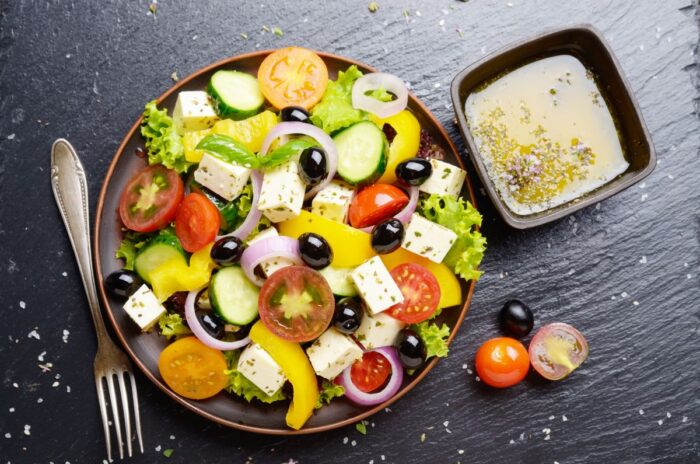
To reverse my fatty liver, I went for what countless health experts, doctors and nutritionist consider to be the healthiest diet in the world: the Mediterranean Diet. I decided to follow it after making some minor adjustments to make sure any and all potentially bad for the liver practices are eliminated (like drinking alcohol).
I also believe that my slightly modified approach to the Mediterranean Diet is the best choice you have: it offers variety, tasty dishes and a lot of options when it comes to what you can eat.
Note: To be completely honest with you, I am 100% sure that when it comes to reversing fatty liver, there are multiple approaches and diets/ways of eating that work just as well.
Eating healthy is the most important part of the equation and it doesn’t really matter how you call your diet or way of eating, as long as you follow truly healthy principles.
But it’s a lot easier to follow some clear guidelines and this is exactly what I plan to chalk out below.
IMPORTANT: If you’re doing research, you will find many people recommending crazy things and strange diets. Make sure to always read between the lines and truly understand who and what is recommended. At least some of the people recommending a diet or another don’t have a fatty liver and never had one.
They don’t really understand all the implications, they haven’t tested their diet and some even did just minor research on the matter.
But this diet that I am recommending (and it’s recommended by plenty of experts, including nutritionists and liver specialists) is the exact one that I followed to reverse my condition. Other people that followed it have also reversed their condition (read Melissa’s story here).
My Modified Mediterranean Diet – Best for Fatty Liver Disease
While extremely healthy, the original Mediterranean Diet without modifications is just a healthy way of eating and living, but not aimed directly at curing MASLD/fatty liver.
So I made some small changes to make it even healthier for those suffering from liver-related problems – like cutting out sugars, alcohol ( those with fatty liver must stop drinking alcohol) and so on.
Without further ado, let’s check it out below!
1. Fruits and vegetables

These two categories should be the things that you consume the most of, with vegetables being the bulk of your meals, no matter if we’re talking breakfast, lunch or dinner. Eat them raw, boiled, steamed, baked (without any added fat) or grilled.
When it comes to vegetables, mixing and matching is what you should do. We still need to keep an eye out on the carb intake, and some of the vegetables out there (usually the tastiest ones) are have slightly more carbs than others.
While you can still eat these higher carb vegetables (because they also contain large amounts of fiber, minerals, vitamins and various other nutrients), they should not be the bulk of your meals.
Check out the list below for some of the vegetables that have the highest amount of carbohydrates per 100 grams. These are the ones you should have the least amount of during any meal (but you can still have them regularly):
- Sweet Potatoes: 23g
- Potatoes: 20g
- Sweet corn: 19g
- Parsnip: 18g
- Green Peas: 14.5g
- Acorn squash: 12g
Also, although not vegetables – but consumed as vegetables, Plantains have 32% carbs, while Cassava – which is not popular in all areas – has around 38 grams of carbs out of 100.
All in all, most vegetables still have less than 10 grams of carbs per 100 grams of product, so they can be considered safe to eat.
Even those listed above are still OK – especially if we compare them with raw sugar which is 100% carbs, or your regular chocolate which can have up to 60 grams of sugar out of 100.
As far as fruits are considered, you can still have plenty of those because, even though higher in carbs than vegetables, they also contain fiber and various other nutrients that help us.
Plus, as I already mentioned in other articles, the fructose from the fruits, combined with the rest of the nutrients, is something that our bodies have been processing for tens of thousands of years – so they’re more accustomed to it than they are with processing raw sugar, which was introduced into our diets much, much later.
Just like with vegetables, you should try to consume more of the low carb fruits than the higher carb ones. Fruits that are high in carbs include:
- Bananas
- Grapes
- Melons
- Mangoes
- Apples
- Pineapples
Lower carb fruits include:
- Watermelon
- Strawberries
- Cantaloupe
- Raspberries
- Oranges
- Peaches
However, since most fruits have under 20% carbs, but are also packed with fiber and plenty of other nutrients, they remain safe to eat overall.
Of course, all in moderation: you can’t eat pounds of bananas each day and claim you’re following a healthy diet!
Instead, consume them as snacks in between main meals (1 banana or 1 apple as a snack, or a handful of berries, for example) or add them in small amounts to yogurt, oatmeal/porridge (here’s the recipe I use), and so on.
Also, eat the whole fruit or vegetable. While smoothies are perfect choices, as they keep all the nutritional value of the ingredients used, juices (including freshly squeezed ones at home) will remove most of the fiber and nutrients, keeping only the sugar – so these should be avoided if not completely eliminated from your diet.
2. Legumes
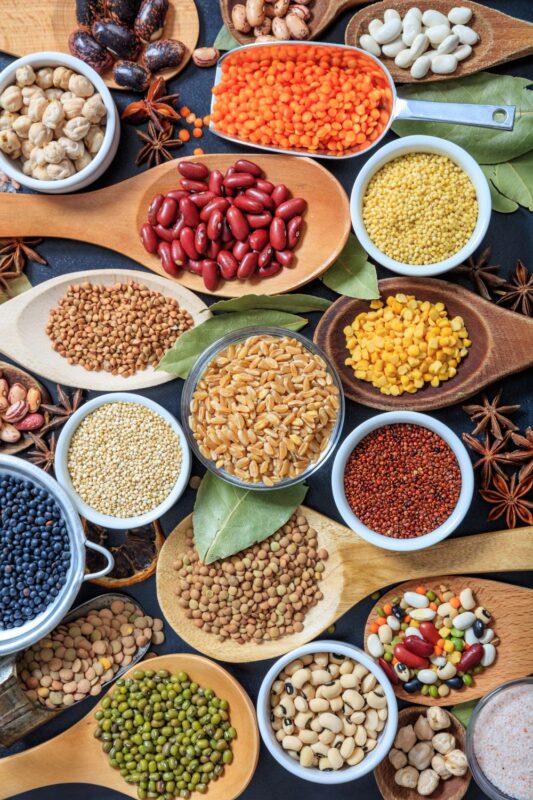
All legumes are excellent as side dishes and can always be a small part of your meals, as they are high in protein and fiber, low in fats and very filling, but also with lower carb values (usually under 15%, depending on what you’re eating).
The legumes to include in your diet, even in higher quantities, include all types of beans (red beans, cannellini, kidney beans, etc), lentils and dried green peas (as they are actually legumes, not vegetables). Soy/edamame are also good choices.
Make sure to have legumes become a staple of your diet, following vegetables and fruits.
3. Nuts and seeds

I usually use them as one of my snacks throughout the day, but don’t eat too much as they are high in calories and fat (healthy fat, though – so not the end of the world).
But since we need to reduce our caloric intake, we have to eat just a small amount of nuts and seeds, especially if weight loss is required.
Choose your favorite nuts and/or seeds, anything goes: peanuts (which are technically legumes), cashews, walnuts, almonds, Macadamia nuts, pistachio, sunflower seeds, pumpkin seeds… anything you can think of can be consumed in small quantities each day.
Just make sure that whatever you eat is not fried/roasted with added oils (as some are) or with additional flavors/sugars or such. You should only eat the plain varieties.
4. Dairy products
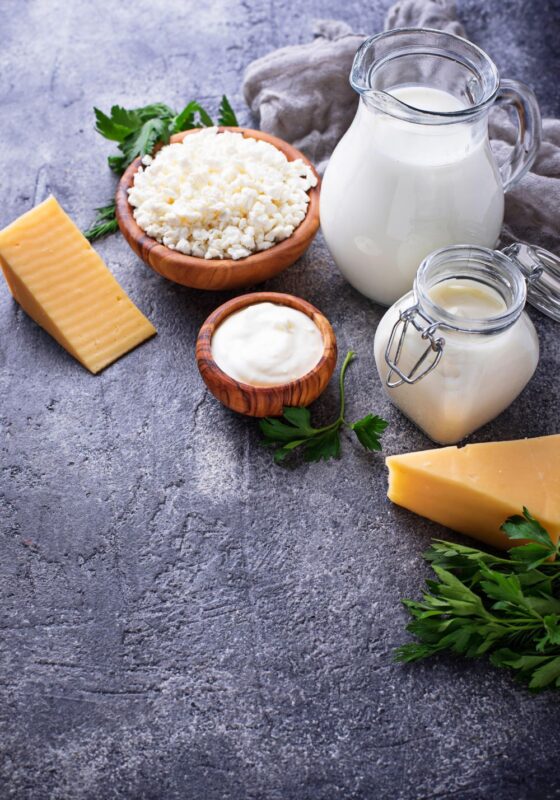
You can still have dairy, but not on a daily basis – and not any type of dairy. While you can have a bit of milk or low fat yogurt each day, you shouldn’t overdo it.
When it comes to dairy, this is what you should NEVER touch (or only have tiny amounts once a month if you miss the taste): butter of any type, any type of cheese with more than 20% fat, full-fat yogurt (including Greek yogurt – learn why here), milk varieties that are high in fat (full-fat milk, half-and-half, heavy cream, condensed milk, etc).
So… what type of dairy can you have? There are still plenty of options left:
- Low-fat yogurt (as long as it doesn’t have added sugar – read the list of ingredients!)
- Low-fat milk (again, make sure there’s no added sugar).
- Various low-fat types of specialty yogurt (Skyr, Kefir, Ayran, etc.)
- Low-fat cheese including Cottage Cheese, Ricotta, or anything else – both maturated or not – as long as it has less than 20% fat.
Many people decide to stay away from all dairy products, and that is completely fine as well.
However, dairy is an important source of Calcium and I personally like the taste. So, since you still have options, you can still have them – and getting used to the low-fat varieties isn’t difficult at all.
I have to repeat an important thing: read the labels and make sure that there is no added sugar or other sweeteners. Unfortunately, in many countries, low-fat yogurt and other low-fat dairy products have added sugar to compensate for the lack of fat, and that’s even worse than the fat itself!
I might sound like a broken record already but… moderation is extremely important: when eating cheese, for example – even for the low-fat varieties – aim for at most 50 grams per meal (and never have it daily).
5. Low fat meat
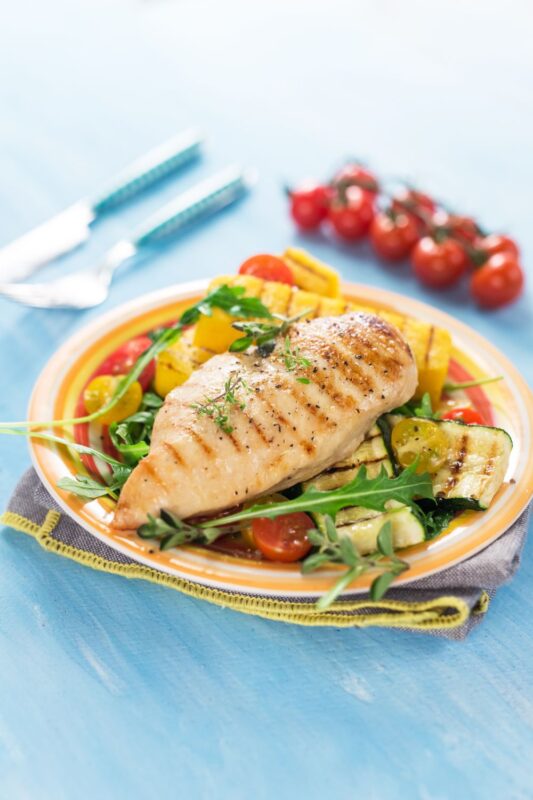
You can consume low-fat meat a few times per week. I had moments when I ate some type of meat daily, so it’s not the end of the world – but don’t make this a habit.
You should only consume low-fat meat, like chicken or turkey breast, as well as lean fish like cod, pollock, flounder, haddock, and so on.
Despite popular belief, you can still have some types of red meat – as long as you go for the leanest parts. Here are some examples of red, fattier meats you can still consume:
- Pork tenderloin: This is the leanest part of the pork and is similar in fat content to a skinless chicken breast (but with a bit more iron). Read more about eating pork meat with a fatty liver here.
- Eye of round roast (aka round steak): It’s the leanest beef cuts, with around 7% fat and plenty of iron
- Salmon: Only go for the wild varieties. Although high in fat, it has omega-3 fatty acids, which are essential for our health. Read more about eating salmon with a fatty liver here.
IMPORTANT: The red meats recommended above are acceptable, but they are also high in cholesterol, so they shouldn’t be consumed often and never in large quantities. If you have meat three times per week, for example, eat red meat just once.
Also, portion sizes should be kept under control. Remember that one portion of any type of meat should be between 85 grams to 125 grams (3 – 5 ounces), roughly the size of an adult’s palm, but cut thinly.
The only exception is with fish and seafood – as long as you go for the leanest varieties available, you can eat them more often, in addition to consuming other types of meat.
Only eat the meats grilled, boiled, or roasted in the oven, with no added fats or sugars (including marinades made with sugars, honey or anything similar). Add plenty of herbs for extra flavor and always pair with a hearty side of vegetables and leafy greens salads (made with my recommended, liver-friendly dressings).
6. Grains and pseudocereals
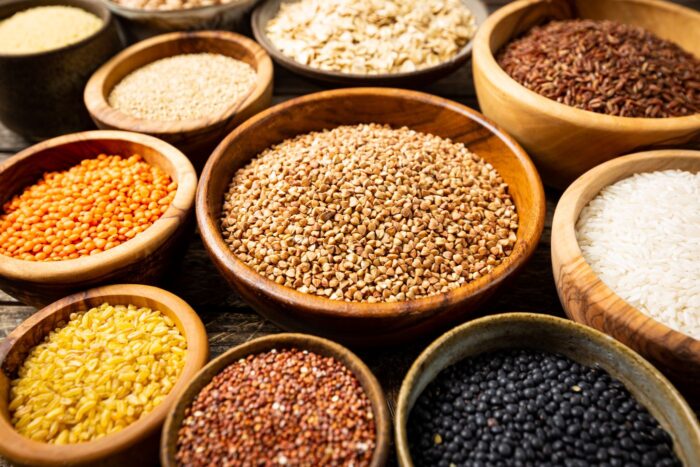
While most of these are on the “foods to avoid” page I linked to in the intro (mainly white wheat, white rice, and any highly processed/bleached grains), you can still have some every now and then – as long as you go for the healthier options.
You can consume, in moderation:
- Whole wheat flour
- Whole grain flour: Barley, Millet, Rye
- Pseudocereals: Quinoa, Amaranth, Chia, Buckwheat
- Whole grain rice: Brown, Black, Red, Wild, etc
Ideally, you should cut bread completely off your diet. If you are like me and simply can’t do it, try to eat a maximum of 2 slices of healthy, whole-wheat or whole-grain bread (without added sugar or other chemicals) per meal or a keto bread replacement, or even Rye bread made with sourdough.
But also keep your daily slices to a maximum of 3, no matter what type of bread you’re eating! If you can have days without eating any bread, it’s even better.
Make sure to read the list of ingredients if you don’t cook your own bread at home. Healthy bread only needs a few ingredients (flour, water, salt, and yeast).
Stay clear away from bread that comes with added sugars, additives, flavorings, preservatives, and such. If mixes of flour are used, make sure that they are all whole wheat/grains.
Usually, healthy breads are difficult to find in stores, so it’s better to prepare yours at home. I purchased a bread maker like this one (affiliate link) and I am happy with it, so you can try investing in one if you don’t have time for manually preparing your bread.
Rice & Pasta are considered an important part of the Mediterranean diet, but they are unfortunately on our “don’t eat” list in most cases. But, just with the other grains and pseudocereals listed above, we can still find some options.
Usually, both rice and pasta are highly processed foods that give our bodies a huge kick of carbs that are quickly absorbed, which is unhealthy. This goes for white rice varieties and regular pasta.
However, you should still be safe if you eat moderate amounts of healthier options. As I mentioned above, brown, wild, or black rice can be consumed as it’s not refined, and therefore the carbs are absorbed slowly. Plus, you get extra fiber and nutrients.
The same goes for pasta. There are varieties made from whole wheat flour, and various alternatives (like lentil, chickpea, or green pea pasta) that might be good. Just read the list of ingredients and look for lower amounts of carbs and higher amounts of fiber. Or just read my in-depth article about pasta and pasta alternatives for fatty liver disease.
But all of these types of foods – no matter if we’re talking about healthy, homemade bread, rye bread, wild rice, or whole wheat pasta – still have high amounts of carbs, so keep portions small and only eat them every now and then.
Also, keep in mind that eating a portion of pasta or rice replaces one of your daily slices of bread.
7. Sugar & sweetened foods/drinks

While it’s true that sugars, like all carbohydrates, give our bodies energy, we should eliminate added sugar from our diet. We’ll still get enough carbs from all the healthy foods we’re going to eat, mainly from cereals, fruits, and vegetables.
You can read this article from Harvard University to learn why our bodies don’t need any added sugar.
So stop eating sugar of any type! Stop adding sugar to your foods!
If you really, really have to (although you don’t!) add just a quarter of the amount you normally would and ideally replace white sugar with more natural alternatives like honey, maple, or agave syrup.
Even better, try to replace it with safe sugar alternatives such as Stevia, Sugar alcohols (erythritol, maltitol), or mashed fruits (like banana or apple puree) if you’re baking something. But say no to sugar.
You will have to stop eating all sorts of sweets that you can buy in stores, restaurants, and pastry shops: candies, cakes, chocolates (although some chocolate is still OK to have), pastries, frozen desserts (ice cream, gelato, sorbet), milkshakes and so on… all of these things should never be consumed once you’ve been diagnosed with a fatty liver, even if you cook them at home (if you add sugars).
All sweets are extremely bad for our health. The high content of carbs in sweets does a lot of harm to our bodies – including the liver.
Add to that the fact that these sweets are usually a caloric bomb made of sugar and fat (with little nutritious value) and you can see why you should never eat them again.
While this is ideal – it’s also probably impossible in most cases. I had cheat days to beat dieting fatigue (try to aim for at most two cheat days per month) and it wasn’t the end of the world. It’s important though to keep the foods with added sugars to a minimum even during the cheat days.
I also try to make my own at home, using sugar alternatives or, at the very least, less than half of the amount of sugar in the recipe (you will notice that it’s still very sweet and tasty!).
Sooner rather than later, you will learn to go for the less sweet and unhealthy options and you will find the sweets you used to eat gross and horrible. And yes, there are some acceptable deserts you can find in specialty shops. Just read the list of ingredients!
8. Alcohol
Alcohol is something that I gave up completely – and you should do the same. There are plenty of studies showing that alcohol is extremely dangerous for a fatty liver, and even though there are some voices that still claim that a small drink every few days will do no harm, I am not willing to take the risk. Hopefully, you are not willing to take it either.

Note: I have never drank, not even a sip of alcohol, since being diagnosed in 2014 and I don’t plan to ever drink alcohol again to help my liver and general health as much as I can.
You can still live a happy life without it, and you can still have a solid social life too. I wasn’t a big drinker in the first place, but like most people out there, I enjoyed drinking a glass or two of wine every now and then or having a few beers when going out.
Transitioning to never having alcohol at all was easier than I had initially thought. I also started drinking non-alcoholic beer (usually when going out, but not always) a year after reversing my MASLD/NAFLD, and it doesn’t seem to have done any harm.
But I only did this AFTER reversing my disease and even now I am drinking non-alcoholic beer in moderation (maybe a total of 4 per month, but I have many months when I drink none).
So… what to drink, then?
I only drink plain water or lemon water most of the time, as well as tea and coffee. It appears that coffee actually helps the liver (according to several studies that I have read), but remember to drink black coffee without sugar, artificial flavors, or coffee creamers. You can add milk as an alternative or read my in-depth article about coffee creamer alternatives.
Freshly squeezed juices are a treat every now and then – but don’t consider them healthy, as they are just a lot of sugar since the most important part of the fruit (the pulp with healthy fiber) is gone.
Smoothies are fine, but I personally don’t like them – if you do though, you can have them too! I also treat myself to sparkling water every now and then as a replacement for fizzy drinks, sodas, and alcohol.
You can read my in-depth article on what to drink if you have a fatty liver for all the option.
Eating tips & other thoughts
Here are some other important things to have in mind when it comes to making this fatty liver diet work for you:
– Cook your own food. One of the most important aspects here, because you can easily reduce the amount of fat used and completely eliminate added sugars and other chemicals / additives, which are just as bad.
I only use extra virgin olive oil and very small amounts of it, mostly for salads. Combine it with Apple Cider Vinegar, which is also considered great for MASLD and you have a perfect, healthy dressing instantly available.
I cook most of the other dishes without using any kind of fat, or adding just a bit when the cooking’s almost over.
After just a few days, you will get used to eating everything without the added oil and you will find out that most foods still taste delicious! And if you’re still wondering what oil to use, read my article here.
Paying attention to HOW you cook your food is extremely important. Simply cooking your food at home – but using a lot of the bad stuff you shouldn’t, frying ingredients and adding sugars and other chemicals won’t give you many benefits.
How many times per day should you eat?
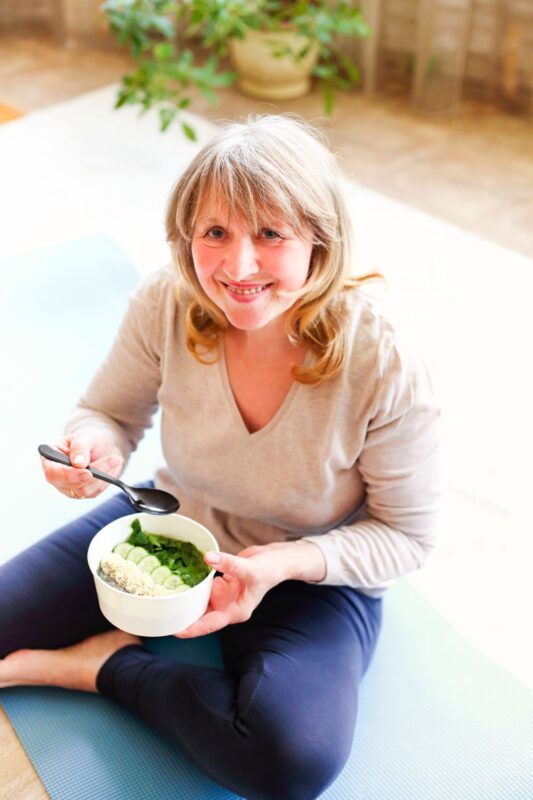
When you’re following this fatty liver diet, you can eat up to five times per day, but smaller quantities. It’s ideal to eat just the three main meals, but since it’s going to be smaller portions, you will probably need the snacks too in order to reach your required daily caloric intake.
I have many days when I actually eat six times per day, like this:
– breakfast between 6:30 AM – 7:00 AM.
– morning snack (at around 10:30 AM)
– lunch (at 1 PM)
– afternoon snack (at around 4 PM)
– dinner (at 6 PM)
– sometimes a late snack at around 8 PM (my goal being that of getting rid of this final snack).
You can adapt this to your own schedule, of course. The golden rule of thumb here is to eat multiple times per day in order to reduce hunger (the hungrier you get and the longer this lasts, the higher your chances of making bad choices).
Also, try to eat your last meal or snack at least 2 hours before sleeping – the longer you can go, the better.
If you are comfortable eating just the three main meals of the day, it’s even better. You don’t HAVE to eat the snacks, but if you are hungry (and most likely you will be!) it’s best to have them. Always keep quantities in check though and never overeat. Which gets us to…
How much should you eat?
Portions should be small, but you don’t have to eat like a supermodel that wants to lose even more weight. You still need to meet the daily calorie intake that you’re aiming for (which, for most adults, is around 2,000 kcal/day).
If you are used to eating large portions, and eat until you feel full (that was my thing), don’t try to drastically reduce the size of the portion to, let’s say, a quarter of what you used to eat.
Instead, reduce them gradually, taking out a bit more every few days, over the duration of a month, until you reach the perfect amount. It’s very easy to overeat, so make sure that you keep portion sizes under control!

Of course, this only goes if you must lose weight, as most of us do. You will also have to learn to eat like this forever, because you will also need to keep your weight under control after you reverse your fatty liver.
It’s a complete and permanent lifestyle change that might sound horrible now, but it’s one you will not only get used to, but you will start to appreciate sooner rather than later.
When losing weight, the key to achieving it is calorie deficit: this is the only thing that you need to lose weight. Calorie deficit can only be obtained in two ways: eating less and/or exercising or increasing your physical activity.
So if you need, let’s say, 2,500 calories to keep your current weight, reduce the daily calories to 2,000 – 2,200. This will see you lose around half a kilogram (1.1 pounds) per week, which is considered a safe amount.
Then, if you still need to lose weight, reduce the daily calories even more, until you reach your ideal weight and then keep consuming the required amount of calories each day to stay there.
This way, you will give yourself time to gradually get used to the smaller portions, and taking it slower will have the benefit of making it easier for you long term.
If you’re currently eating 4,000 calories and cut them to 2,000 per day, it will be a huge shock – and more difficult to stick to this longer term. So take it slow, and let your body adjust, without taking it TOO slow.
Also look into high volume, low calorie foods, at least at first. These are foods that let you eat larger portions, but have few calories and are still healthy, like zucchini, cucumber, leafy greens, or watermelon (among many other).
You can use these too during your transition period, but the main goal is to teach your body to adapt to small portion sizes eventually.
You will naturally lose weight!
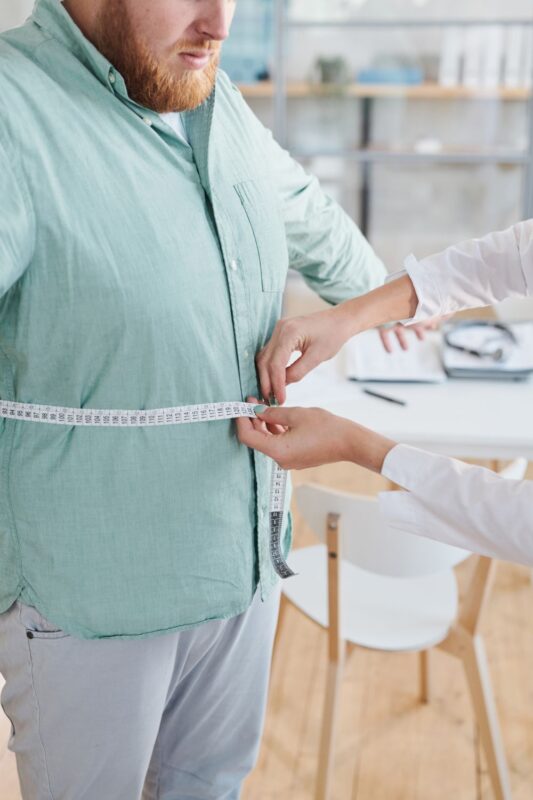
One of the things that I was advised to do after being diagnosed with a fatty liver was to lose weight. Most likely, this will be your situation, too. And that’s a good thing, because usually, losing at least 10% of your weight will greatly improve (or even cure) your condition. (Read the study about this here).
When I started the diet recommended above, I weighed 210 lbs (I am a 5.11″ guy). I naturally lost weight without any extra exercise, and without starving.
I went down to 190 lbs in just three months, and this was the reason why I didn’t supplement my diet with exercising: you don’t want to lose weight too fast, as you might put extra pressure on your liver.
Please have in mind, though, that this fatty liver diet is not a weight loss diet. In my case, it helped a lot because I used to eat huge portions in the past and unhealthy foods.
Just switching to lower portions and eating completely healthy helped me lose weight, then stick to my new weight over the years. I was so surprised to see how much eating habits affect our weight!
Eventually, though, you will reach a point where you won’t lose weight anymore, or weight loss will be much slower. This is when you should start bringing exercising into your life.
From personal experience, I can say that this happens after three months of changing to the Mediterranean diet and losing weight.
Exercising is extremely important, so do something extra even if it’s just walking 10,000 steps per day. But more intense forms of exercising like jogging or going to the gym is preferred.
The higher the intensity, the better. Aim to exercise at least 3 times per week, ideally every day. Also take it slow if you are out of shape, increasing your intensity every few days/sessions. Read more about exercising and fatty liver here.
When I started exercising, I only did cardio training: “running” on a treadmill three times per week.
However, I was so out of shape that when I first started doing it, I was only able to run for about 3 minutes straight at a very low pace during my 45-minute session and only walked briskly for the rest.
But just a month later I was running almost half of the time (alternating 3-4 minutes of running with 4-5 minutes of fast walking).
Today, I can easily run, without taking a break, for 35 minutes straight (and I could probably do more if I wanted to). So take things slowly, but be consistent: you will get there! You just need time to adjust.
Is this fatty liver diet an easy one to follow?

From personal experience, I can honestly say that it’s not easy. In my case, it came as a drastic change, and cutting all those unhealthy foods off the menu was difficult.
There were cravings, there were times when I just broke down and ate a lot, feeling miserable with myself afterward.
So probably you will find it at least a bit difficult too – there’s no need for me to sugarcoat it. Be prepared!
Fortunately, the diet itself is really nice and still allows you to eat a huge variety of dishes and you’ll never get bored eating the same things over and over again.
The most difficult parts (at least in my case) were reducing the portion sizes, reducing the amount of fats, and eliminating sugars (the latter being the hardest!).
I always used to have a cake or some candy lying around before being diagnosed, and it was really difficult to put them away. But looking back, this habit was probably one of the main reasons why I developed a fatty liver in the first place…
Fortunately, you will soon get used to eating apples as dessert instead of sugary sweets, so it’s not a never-ending hell you’re going to go through (but the first two weeks will be tough!)
You will get used to this new life quickly and you will start to love all the foods you’re eating every day, knowing the fact that you’re eating your way to a healthier life. And you will feel AMAZING!
Actually, if you will taste any fried food or fatty food a few months after switching to this diet, you will find it yucky and way too greasy. I was surprised to realize that just a few months before, I used to consider that food yummy.
I think that you will start seeing major improvements after the first month of following this modified Mediterranean diet, and at around the 6-month mark, you will feel like another person (slimmer, healthier, and full of energy) and have no more pain under the right rib, nor any of the regular symptoms.
There is one important thing to have in mind: it probably took you years (if not decades) of eating unhealthy and becoming unfit to get where you are now.
You can’t expect things to change in a week or even a month. Healing also needs time – but fortunately, not years or decades if you do it right.
And after you reverse your fatty liver, make sure to still stick to this Mediterranean diet. Don’t get back to old habits, as your fatty liver will most likely come back too. Stick to eating healthy, follow this balanced diet, and enjoy being healthy!
IMPORTANT: Don’t forget to bookmark this page to be able to easily visit it in the future to make sure that you are indeed following the correct steps and eating the right things for your body. I know it’s a lot of information to take – but you’ll start getting used to it with practice.
Or just PIN it using the image below:
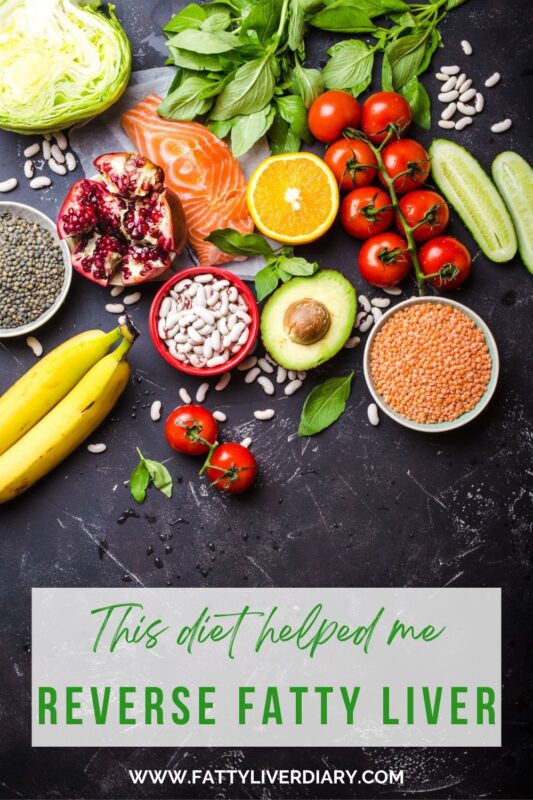
If you still have questions, don’t hesitate to ask them by commenting down below.

I was diagnosed with a fatty liver back in 2014 and managed to reverse it by mid-2015. Since then, I’ve been studying it, continuously updating my knowledge with the latest scientific findings and practical approaches to give others the help they need to reverse their condition.
My approach to managing fatty liver is holistic, balancing scientifically-backed information with real-life, practical advice based on personal, direct experience.
I am also the admin of the Fatty Liver Support Group on Facebook and the Fatty Liver Subreddit.

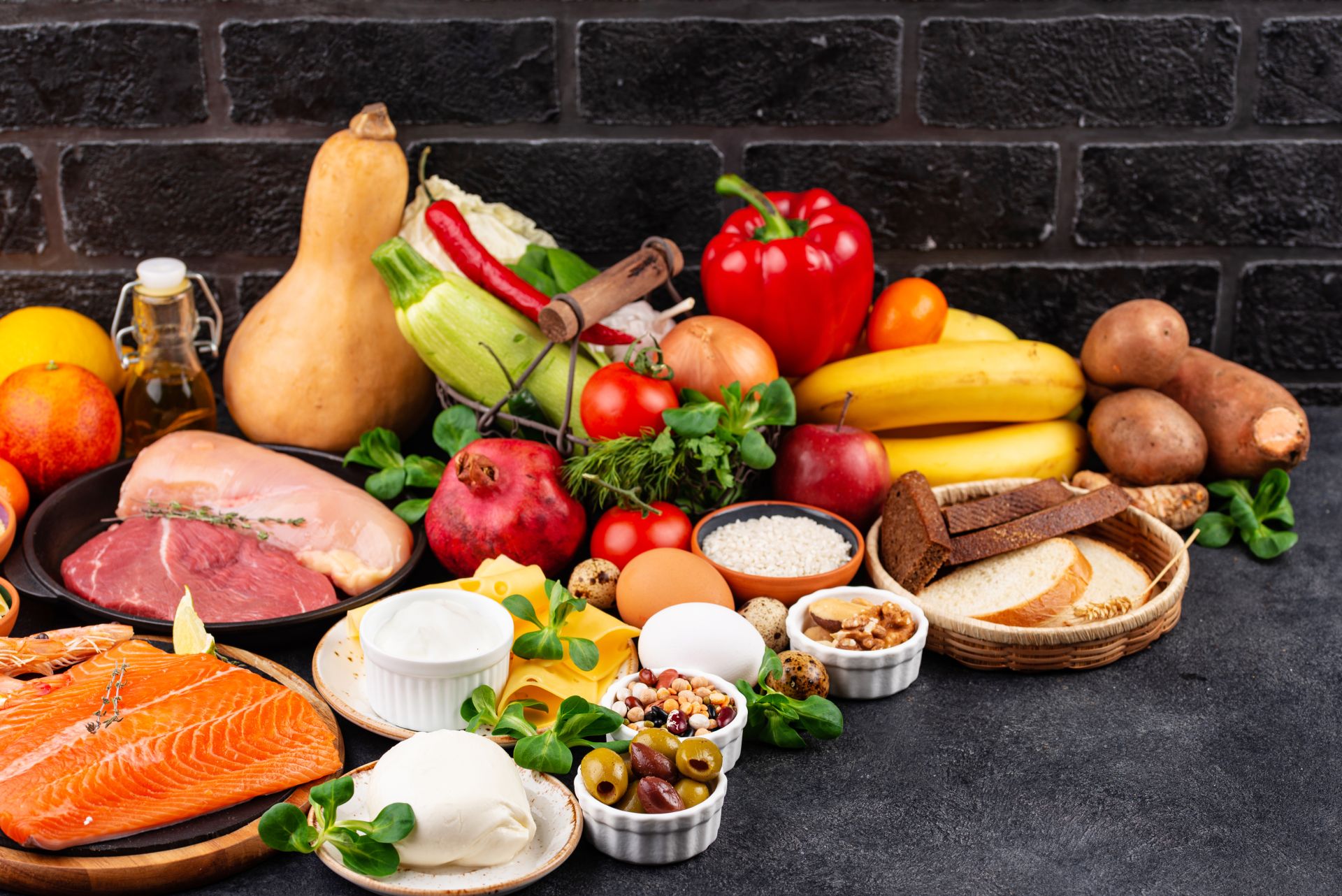
Hi Lynn
I am a bit confused about eggs. Some say that eggs are good and some say they are bad for a fatty liver. What do you suggest?
I think that anything consumed in moderation is safe to eat. Egg yolks are indeed high in cholesterol and saturated fat, which is not good, but they also have many vitamins and minerals that are extremely healthy. Plus, they are tasty 🙂
So I think that 1 egg or 2 per week shouldn’t do much harm, but don’t fry them in oil – boil them or make poached eggs instead.
Hi. Thanks for the effort of writing this blog. I have been diagnosed with mild fatty liver (non-alcoholic) 4.5 months ago and I have changed my diet significantly to Fruits, Vegetables, and Fish with some brown rice and even changed my lifestyle – jogging and walking every day. However, my weight has dropped from 73.5kg to 62kg in 4.5 months an. my friends said I have slimmed down. I’m afraid that the weight loss might go further, so I wish to know whether I still can consume carbohydrates (such as rice and potato) and meat. Or are there any ways to gain weight healthily amid my fatty liver disease.
Hi, thank you so much for this. I was diagnosed on January 4th this year, just 3 days ago. That night I cooked myself a steak and had a glass of wine. Saturday morning I decided I will try a mostly plant based diet, with occasional meat and some seafood. I’m already missing sugar and bread, (withdrawals?), but at only 31, I seriously need a lifestyle change. Last year I had my gallbladder removed and now this. So I just wanted to say a big thank you for all the information you’re providing.
I am happy to hear it is useful, Judi. Indeed, major changes are required… but you will see that in the end, they are not as tough as they might seem at first.
I wanted to say a quick thank you for the work you put into this blog. I haven’t officially been diagnosed yet but my doc has be going for an ultrasound (that I’ve scheduled for Monday) and a visit to the GI doc. He believes that it’s NAFLD. I’m in that scared mode of ‘crap what else could it be’ but all signs point to that likelihood. So, to avoid going down that BAD internet hole of researching those possibilities, I started looking into how to fix it if that’s what it is. I’ve just read through your site for an hour or two and wanted to extend my gratitude. I hope to be able to get answers quickly and, if this is what I’m living with, I look forward to engaging with you more!
From someone who’s up entirely too late worrying….Thank you! This has really helped!
Sorry to hear about that, Colleen. But at least you’re on the right track, doing your research and preparing to tackle this accordingly. The good thing about a fatty liver is that it can be reversed!
Hi Lynn
Thanks so much for the time you have taken to compile your knowledge and to share with complete strangers.
This evening I made a coffee and stirred in my favourite coffee creamer and as I sipped, wondered what effect the creamer was having on my liver (I have also been diagnosed with NAFLD). So I typed COFFEE WHITENER AND FATTY LIVER DISEASE into Google and your website appeared.
Oh Lord – I have half a can left of the creamer which I love……so I will reduce my intake to one coffee with creamer per day until I have finished it and will not purchase again.
Funny I switched from LActofree milk to creamer…..big mistake.
Anyway, I have been told to drink lemon water and apple cider vinegar water to cleanse my liver.
I don’t eat fried foods but do love crisps and realise I need to eliminate these in order to cleanse.
I am inspired that you have reversed your conditions and begin my journey tonight.
I have saved your website for future reference
It took me a lot of time to learn everything I know today – and I am still learning new things. But you’re doing one of the most important things: research. (The other being changing your actual diet). It looks like you’re on the right track and I am sure you will have no problem replicating my success and reversing your fatty liver. Good luck!
Hi Lynn..since being diagnosed with NAFLD beginning of may 2019 ive lost 49lb and I’m now 10lbs into a healthy bmi
I’ve gone from a uk size 18 to a size 12 which I think is in the USA a from a size 14 to a size 8
I was very strict while I was loosing the excess weight..didn’t even have one cheat!
I don’t want to loose anymore weight..never thought I’d be able to say that !
While I was loosing the excess weight I only eat veg, Ie cauliflower and broccoli,chicken,fish,rolled oats,walnuts and 1 small slice of wholemeal low carb bread per day,
extra-virgin olive oil, 3oz sweet potatoe once every two weeks .. I found it hard to find enough calories to get above 800 Cals a day whiteout eating anything carby
Since I’m within my bmi now I’ve added
brown rice, 3 egg whites a few berries now and again
2 slices of wholemeal (low carb bread) of course
6oz of Greek plain yoghurt (no added sugar) and still eating the veg..(which I have to say used to make me gag as I really don’t like the taste) that in itself was a challenge..!
lynn My question is I’m still only reaching around 1500 calories and I should be on about 1868 Cals a day
What else could I add to up my calories
Hope you can help !
Congrats for taking such good care of yourself! Great progress so far and I am sure you can keep this up.
As for extra calories, you can add one additional snack per day (or maybe eat a bit more during one of the main courses). Adding any sort of seeds or nuts is both healthy and high on calories. Plus, you’re not getting extra carbs! I also believe that now you can safely use an entire egg (and maybe make an omelet) since the yolk – even though high in fat – has a lot of really good minerals and vitamins (including Vitamin D). Plus, 1 yolk has about 4.5 grams of fat, which is not that bad at this time. Also, avocadoes are recommended – they have healthy fats and more calories than regular vegetables or fruits.
Also, I see that you don’t have any fruits in your diet. I used to eat lots of fruits and still reversed my fatty liver. Fruits are healthy and our body deals with their carbs differently than it does with the refined sugar. Add some lower sugar fruits, but don’t shy away from eating one apple a day and even a banana every now and then. At this point, they would do more good than harm (if they would ever cause any harm), in my opinion.
In the end, even with a deficit of 300 calories per day, you won’t keep losing a lot of weight and you’ll reach the point where you won’t lose any more pretty soon. Remember that 1 pound has around 3,600 calories… so the weight loss won’t be as drastic as it was before and as long as you remain at a healthy weight (and not go underweight), that shouldn’t really be a problem.
Hi Lynn,
Just wanted to say hello and thank you for your blog. I read it and things suddenly clicked. Under the advice of my GI doctor, I tried Keto which he strongly recommended for my F3 Fibrosis. I have been confused about what to eat from being on Keto, Weight Watchers and then Paleo, Have been on other diets in the past and having been on so many makes choosing healthy foods confusing. I felt like your blog was straight and up-front. And you talked about a lot of the food issues that I have, Now I see that things are okay in moderation like whole grains. I am definitely going to try the Mediterranean diet again and feel I will be successful after reading your experiences.
Happy to help, Beppy! I just updated this year the article about the Keto diet – which was named the worst diet of 2019 – so I’m happy you didn’t go through with it. Dealing with fatty liver is more of a complete and permanent lifestyle change and not as much of a diet that fixes you before going back to old eating habits, so the Mediterranean diet is perfect for that. Paleo is just as good in my opinion, although a bit more restrictive. Either way, as long as you stick to eating clean and exercise and stay on track, you will feel much better!
I came across your blog primarily looking to support my husband with his NAFLD. Whilst we maintained a very clean diet when he was first diagnosed, 2years ago, some old habits have returned, mostly down to us both working full time with 2 very sporty teen daughters who often do not finish training until after 8pm most evenings…sometimes it’s easy to rustle up a wrap or something just to satisfy hunger, and I just know this isn’t good enough for any of us. I realise as a family we need to get back on track – my husband has gained some weight again due to adding bread and cheese and sometimes pasta back into the house! I found your meal suggestions very helpful and hopefully we can all enjoy these as a family – as you said, the changes need to be for life. We live in the Med, so in reality, this should be easy!! Do you have a ‘shopping list’ that you would recommend? Thanks again for writing to help others.
Lee, I am happy to hear that you’re getting back on track with the healthy eating. The biggest challenge is indeed sticking to this new way of living. I also slouched a bit after reversing my fatty liver back in 2015 and in the past year I gained 5 kilos 🙁 I am also back on track starting December, with good results. So probably these minor setbacks are just part of life – but we should take action ASAP.
Regarding the shopping list, I have an article that requires a bit of maintenance, but it might be better than nothing to start with: https://www.fattyliverdiary.com/monthly-shopping-list-for-fatty-liver-reversal-healthy-foods-to-order-online/
I am planning to create an easier to read list, but until then hopefully the one above will help a bit.
Hi Lyn thank you for your information it certainly feels like you need a phd in nutrition when your diagnosed with nafld.
I am pretty much on top of the game right now.
Looking forward if I reverse my condition is there room to change the diet somewhat going forward.
Eg. Introducing a moderate amount of bread, read meat and dare I say it cheese.
It’s just a life time of fish and severely restricted Diet doesn’t cheer me up.
Would like to hear your view.
Definitely, Bev! I hadn’t stopped eating bread, cheese or red meat even during the dieting times, even though I only ate very small quantities rarely. But once your liver improves, you can certainly bring back some of your favorites, but have them in moderation.
Lynn,
I have been on my journey now for about six months to try and eliminate my fatty liver. I have been really tuned in on avoiding HFCS and Palm Oil and Tocopherols. My question is how much did you worry about those kinds of ingredients? I have plenty of areas where I need to make improvements in my diet (sugar) and exercise, but curious how much you studied ingredients in everything. Also what would you get at a restaurant for example?
Dave, I always read the ingredients and pay close attention to what is inside the products that I will consume. High Fructose Corn Syrup and any type of sugar is instantly a big no, so definitely stay away from those. Palm Oil (especially hydrogenated) is also good to stay away from. It’s the first time I hear that somebody mentioning staying away from Tocopherols, so I will have to do more research on that.
But yes, it is a good thing to study the ingredients and only get what is good for you. As you probably know from reading those lists of ingredients, there’s not a lot – at least not in terms of ready-made stuff.
As for restaurants, the best options will generally be salads. Greek, Bulgarian, Mediterranean – mixes of vegetables in the end. Skip the dessings (as they are high in sugar and fat) and go for plain oil/vinegar instead.
I appreciate all your research and I’m definitely going to take your advice on eliminating the fats, white starches and high fat dairy. But I was wondering if you have researched raw dairy? I make smoothies with fresh berries, banana, raw honey and raw kefir. And I have been told raw butter is safe but I’m not sure of this. I know people who eat lots of raw butter claiming our brains need the fat and that it may help in preventing dementia. What have you read regarding this?
You can get good fats from other sources, such as fatty fish. Yes, our bodies do need some fat and as long as you don’t go over the daily limits, it can come from raw dairy also. But I would stay away from butter and focus on the kefir instead as it has less fat per 100grams 🙂
This is such a relief to read. Thank you, thank you, thank you, for making this website. I’m only 30 and I’ve been incredibly depressed over the last 8 years, and of course my diet and eating habits went to absolute shit because of it.
After much therapy and introspection, I finally regained control on my life and started to be kinder to myself, so it was very scary when I was diagnosed after getting abdominal pain for several months. I don’t know how bad it is yet (still waiting on 2nd blood test) but reading this gives me hope that I’ll be ok.
For some reason I’ve found it very easy so far with my diet changes (thankfully I LOVE fish) and I’ve had no trouble cutting out my go-to cravings and comfort eating food (fingers crossed that lasts). I don’t miss the chocolate, mainly I just miss eating cured meats like salami and parma ham haha!
There is a lot of conflicting advice online for fatty liver and I’ve been really struggling to parse what is ok to eat. A lot of places claim that low fat yoghurts (and other low fat foods) for example are to be avoided because of the added sugar- and instead to opt for high fat yoghurt like greek yoghurt. What is your stance on this?
Happy to be helpful, Monique. You can do this!
Regarding the yogurt, I always go for the low fat one without added sugar. During my travels abroad, I saw that in some countries the low fat one surprisingly has added sugar. In that case, I would go for the lowest fat option that has none of that.
So in conclusion, I would always go for an extra bit of fat instead of added sugar. Try to stick to around 3% if possible, though, don’t go for the full fat ones as fat is also bad for us.
I just recently received a ultrasound because I was having pain once in awhile on my left side of ab …like 2 inches left of belly button…they thought it was a hernia for awhile, before the scan…
My doc found from the scans that I had a slightly enlarged liver and slightly enlarged spleen…. Does this mean fatty liver?…I would suspect so ..
My doc said my blood levels are good also, but to keep an eye on it.
I just started going to this doctor… kinda natural doc with some modern mixed in .. before this I started eating healthier, but now I’m going rogue healthy after seeing your article, so I can reverse…
My guess is I may have had an enlarged liver for awhile as I was always into ice cream.. cakes…candy… I’m changing now, I have no choice…
Thanks Lynn for the article, any advice is appreciated… and is an enlarged liver a fatty liver? it seems this is the new norm in America and is getting more common I’m hearing
Sorry to hear about your health problems. But yes, an enlarged liver could be caused by a fatty liver. Only a doctor can say for sure.
But definitely cut back on the ice cream and cakes and switch to healthy eating. Combine that with at least a bit of exercising to get on the right track.
Hi Corey,
Just wondering what the outcome was, i just received the same news with. Possible explanation of portal hypertension due a fatty liver.